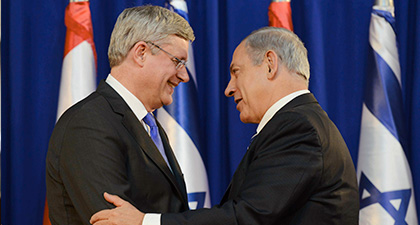A petition calling on the adjudicating committee of the Nobel Peace Prize to reject B’nai Brith Canada outgoing CEO Frank Dimant’s planned nomination of Prime Minister Stephen Harper for the honour says accepting the nomination “would be a disgrace and insult to [the] prestigious award.”
Dimant told The CJN he intends to nominate Harper for the 2015 prize to mark the prime minister’s “moral leadership in the world… especially when it comes to standing up to radical Islamist terrorism,” has garnered considerable backlash, including the online petition, created by Calgary resident Edward Tanas on the website change.org.
As of Sept. 9, the petition had amassed almost 27,000 signatures.
The nomination idea has also drawn criticism from the Vancouver-based Canada Palestine Association, whose chairperson, Hanna Kawas, was quoted in the Vancouver Observer Sept. 1 as saying “with nominating [Harper], you don’t know whether to laugh or cry… it’s outrageous.”
Charlie Angus, NDP MP for Timmins-James Bay and the official opposition critic for ethics, also spoke out against the nomination, tweeting on Aug. 31, “Nominating Stephen Harper for the Nobel peace prize is like nominating [Sun News contributor Ezra] Levant for the Pulitzer prize. Sorry Steve you’re no [Lester] Pearson.”
He later told The CJN: “My comment was more sardonic than anything else. I don’t think anyone’s going to pay much more attention to this nomination. The role Canada’s traditionally played internationally is trying to bring parties back to the table, to de-escalate. Mr. Harper hasn’t shown that… we haven’t seen that kind of leadership from this leader.”
Dimant, who, in his capacity as professor of modern Israel studies at Canada Christian College, qualifies as a nominator under Nobel rules, said he viewed the nomination as an opportunity to help restore prestige to an award he believes has been diminished in stature of late.
“When [former Palestinian leader Yasser] Arafat received [the Nobel Peace Prize in 1994], it certainly diminished the very notion of what a peace prize is,” he said. “And when [U.S. President Barack] Obama was given the prize for doing nothing except the anticipation of something, it diminished it. I felt it was time to elevate the prize again to the position it held historically.”
Dimant further praised Harper for “speaking up for the people of Ukraine” as well as for the prime minister’s vocal condemnations of groups like Hamas, Hezbollah and ISIS.
Dimant also gave a nod to Harper’s staunch support of Israel, saying, “Here is a man who truly understands what it means to fight for freedom, national liberation and to understand that people have a right to return to their homeland and live in security and safety.
This past January, Dimant and a delegation of other Jewish community leaders accompanied Harper on a trip to Israel, at which time Dimant praised Harper’s “unparalleled” support for Israel and his “principled stance on issues of importance to the Jewish community.”
Angus, however, said Harper’s approach isn’t deserving of the Nobel Prize.
“[Issues connected to the Israel-Palestine conflict] are such emotionally-heavy… traumatic issues for people on all sides,” Angus said. “We want a prime minister in Canada who says, ‘Let’s find a way to move toward peace and resolution.’ That was the role [former Canadian prime minister and Nobel Prize winner Lester] Pearson played in the Suez Crisis internationally [when, in 1956, he proposed a UN peacekeeping force to help ease the British and French out of Egypt], and people saw that as a role for Canada to play.”
Neither Edward Tanas nor the Canada Palestine Association could be reached for comment, despite multiple attempts to contact them.
The deadline for the 2015 Nobel nominations is next February.
According to the Norwegian Nobel Committee website, the 2014 prize has 278 candidates, the highest number on record. The nominees include Pope Francis, Malala Yousafzai, Edward Snowden and Russian President Vladimir Putin.
The 2014 winner will be announced in early October.
